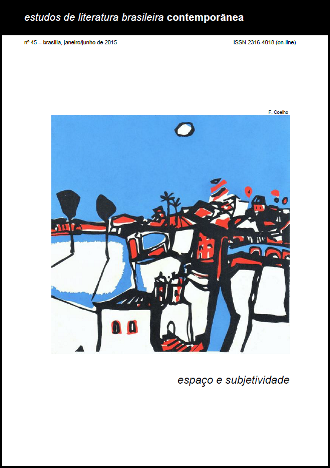Os discursos do etnólogo, do filósofo e do ficcionista na estrutura do romance Nove noites
DOI:
https://doi.org/10.1590/2316-40184512Abstract
Este artigo pretende colocar em diálogo dois textos: “A estrutura, o signo e o jogo no discurso das ciências humanas”, de Jacques Derrida, pensador francês, e Nove noites, de Bernardo Carvalho, romancista contemporâneo brasileiro. O texto de Derrida parece conter as matrizes do pensamento desconstrucionista do filósofo e parte de uma aporia lançada por Claude Lévi-Strauss na dicotomia natureza-cultura para questionar o modelo centrado do pensamento ocidental. Esse escândalo, assim, está ligado à atividade do etnólogo e tem suas origens na etnografia. Este texto procura, então, refletir como a ficção se apodera do discurso das ciências humanas para questioná-la, num movimento semelhante ao pensamento de Derrida na interpelação permanente do desconstrucionismo ao discurso científico. A narrativa, que de início parecia conduzir para a resolução de um crime, à guisa de romance policial ou relato jornalístico, frustra as expectativas do leitor, terminando por diluir o que parecia ser a trajetória segura de uma estrutura montada em torno de um firme centro.
Downloads
References
BENJAMIN, Walter (1994). Magia e técnica, arte e política. São Paulo: Brasiliense.
BLANCHOT, Maurice (1998). Le livre à venir. Paris: Gallimard.
BLANCHOT, Maurice (1969). L”Ÿentretien infini. Paris: Gallimard.
BLANCHOT, Maurice (2003). La part du feu. Paris: Gallimard.
CARVALHO, Bernardo (2002). Nove noites. São Paulo: Companhia das Letras.
DERRIDA, Jacques (1967). L’écriture et la différence. Paris: Éditions du Seuil
Downloads
Published
How to Cite
Issue
Section
License
Authors who publish in this journal agree to the following terms:
a) The authors maintain the copyright and grant the journal the right of first publication, the work being simultaneously licensed under the Creative Commons Attribution License-Non Commercial 4.0 which allows the sharing of the work with acknowledgment of the authorship of the work and publication this journal.
b) Authors are authorized to enter into additional contracts separately, for non-exclusive distribution of the version of the work published in this journal (eg publish in institutional repository or as a book chapter), with authorship recognition and publication in this journal.
c) Authors are allowed and encouraged to publish and distribute their work online (eg in institutional repositories or on their personal page) after the editorial process, as this can generate productive changes, as well as increase the impact and citation of published work (See The Effect of Free Access).
d) The authors of the approved works authorize the magazine to, after publication, transfer its content for reproduction in content crawlers, virtual libraries and the like.
e) The authors assume that the texts submitted to the publication are of their original creation, being fully responsible for their content in the event of possible opposition by third parties.


